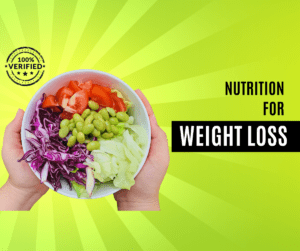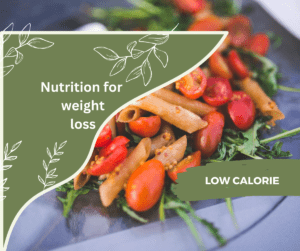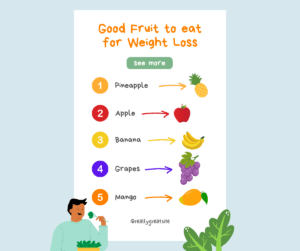Nutrition for Weight Loss: Science-Backed Fat Loss Tips
What Is Nutrition for Weight Loss?

Nutrition for weight loss involves the strategic consumption of nutrient-dense foods to support fat loss, preserve lean muscle mass, and promote overall metabolic health. Unlike restrictive diets that often yield temporary results, a focus on proper nutrition emphasises sustainable, long-term health outcomes.
According to the World Health Organization (WHO) and the National Institutes of Health (NIH):
-
A healthy diet includes a variety of foods such as vegetables, fruits, whole grains, lean proteins, and healthy fats.
-
Weight loss occurs when you consistently maintain a caloric deficit, meaning you consume fewer calories than you expend.
-
Emphasis is placed on nutrient density—selecting foods high in vitamins and minerals relative to their calorie content.
While maintaining a caloric balance is fundamental, the quality and composition of food play a crucial role in overall health.
Why Nutrition for Weight Loss Matters in 2025
Obesity rates are escalating globally, with over 1 billion people living with obesity as of 2022. This includes 890 million adults, accounting for 16% of the global adult population. Additionally, 43% of adults were classified as overweight .
In 2025, advancements in personalized nutrition, gut microbiome research, and AI-driven meal planning are transforming our approach to weight loss.
Modern evidence indicates that:
-
Food quality significantly impacts hunger regulation and fat storage.
-
A substantial proportion of individuals experience weight regain within two years without sustained behavioral and dietary changes .
-
Customized diets are more effective than generic, one-size-fits-all plans.
Step-by-Step Guide to Losing Weight Through Nutrition
1. Create a Sustainable Caloric Deficit
-
Aim to reduce your daily intake by 500–750 calories to achieve a weight loss of approximately 1–1.5 lbs (0.45–0.7 kg) per week.
-
Avoid extreme diets (<800 calories/day) unless under medical supervision.
2. Prioritize Nutrient-Dense Foods
-
Increase consumption of whole foods: vegetables, fruits, legumes, and whole grains.
-
Incorporate lean proteins: chicken, fish, tofu, lentils.
-
Utilize healthy fats: olive oil, avocados, nuts.
3. Choose a Proven Dietary Pattern
-
Mediterranean Diet: Emphasizes plant-based foods, olive oil, and fish; limits red meat.
-
Low-Carb Diet: Can lead to rapid short-term weight loss; beneficial for those managing insulin sensitivity.
-
Intermittent Fasting: May reduce calorie intake and improve metabolic markers.NCBI+1PMC+1
4. Personalize Your Plan
-
Utilize tools like MyFitnessPal or Cronometer to track intake.
-
Consider AI-based planning apps that adapt to your individual needs.
5. Hydrate and Sleep Well
-
Recognize that dehydration can mimic hunger.
-
Understand that poor sleep disrupts hormones related to appetite (ghrelin and leptin).
Common Nutrition for Weight Loss Mistakes (With Fixes)
-
Mistake 1: Focusing only on calorie counting.
-
Fix: Monitor both calorie intake and nutrient density to ensure a balanced diet.
-
-
Mistake 2: Eliminating entire food groups.
-
Fix: Adopt a balanced macronutrient approach unless advised otherwise by a healthcare professional.
-
-
Mistake 3: Neglecting to plan for real-life situations.
-
Fix: Prepare meals and snacks in advance for events like travel, holidays, or periods of stress.
-
-
Mistake 4: Ignoring behavioral habits.
-
Fix: Practice mindful eating, establish regular meal times, and be attentive to portion sizes.
-
Tools and Resources for Smarter Weight Loss Nutrition
Free Calculators & Trackers
-
TDEE Calculator: Determine your Total Daily Energy Expenditure to understand your caloric needs.
-
MyFitnessPal: Track meals and monitor macronutrient intake.
-
Cronometer: Monitor micronutrient intake and overall nutrition.
AI-Based Tools
-
ZOE App: Provides personalized nutrition insights by analyzing your gut microbiome, blood sugar, and blood fat responses.
-
EatLove: Offers custom meal plans tailored to your preferences and nutritional needs.
Educational Resources
-
NIH Weight Loss Guide: Comprehensive information on healthy weight loss strategies.
-
WHO Nutrition Facts: Global guidelines and facts on maintaining a healthy diet.PMC+3AthleticFly+3Medical News Today+3
FAQs About Nutrition for Weight Loss
Q: What diet works best for weight loss?
A: Mediterranean, low-carb, and low-fat diets have all demonstrated effectiveness. The optimal diet is one that aligns with your lifestyle and can be maintained consistently.
Q: How much should I eat to lose weight?
A: Reducing your daily intake by 500–750 calories typically results in a weekly weight loss of 1–1.5 lbs (0.45–0.7 kg).
Q: Is intermittent fasting effective?
A: Yes, for many individuals. A recent study found that the 4:3 intermittent fasting method—entailing three non-consecutive days of significant calorie restriction per week—may lead to greater weight loss and improved cardiometabolic outcomes compared to daily calorie restriction .
Q: What’s more important: calories or food quality?
A: Both are crucial. While calorie intake determines weight change, the quality of food affects hormones, cravings, and energy levels.
Q: Do I need supplements?
A: Not necessarily. A balanced, nutrient-rich diet typically provides all essential nutrients. Supplements should only be considered under professional guidance.
Conclusion
Achieving weight loss through nutrition is not about quick fixes but about implementing strategic, sustainable changes. By focusing on calorie balance, nutrient-dense foods, and consistent behavioral adjustments, lasting progress is attainable.
With support from scientific research, expert consensus, and emerging technologies, the future of weight management emphasizes personalization and precision. Rather than resorting to fad diets, equipping yourself with accurate information and cultivating consistent habits is key.
Ready to take control of your health? Check simple strategies to burn belly fat. Learn more



